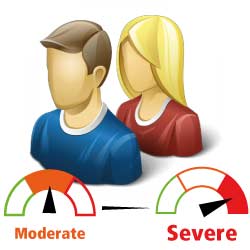- Avoid exposure to allergen
- If there are excessive secretions and sneezing add:
- Fenistil 4mg caps 1cap every 4-6 hours
- If there is nasal obstruction add :
- Rinomest 6.5mg/ml spray 1puff 4-6 times daily
- In more sever cases add:
- Aierxem 50mcg/dose nasal spray 2 sprays in each nostril once a day
Unicast 10mg once daily at bed time
Corticosteroids nasal spray (Fluticasone)
Available forms:
- Flixonase, Rhinase, Dalman, Avamys, Aierxem: 50mcg/dose
Indications:
corticosteroid indicated for the management of thenasal symptoms of perennial nonallergic rhinitis in adult and pediatric patients
aged 4 years and older.
Dose:
For intranasal use only. Recommended starting dosages:
- Adults: 2 sprays per nostril once daily (200 mcg per day).
- Adolescents and children aged 4 years and older: 1 spray per nostril oncedaily (100 mcg per day).
Dimetindene
Available forms:
- Fenistil: drop 1mg/1ml, 4mgcaps, 1mgtab
- Pedia fast: drop 0.1g/100ml, 0.01g/100ml syrup
- Alergin: drop 1mg/1ml (1 ml = 20 drops).
- Fencil: drop 1mg/1ml
- 1 ml contains dimetindene maleate 1 mg (1 ml = 20 drops).
Therapeutic indications
- Symptomatic treatment of allergic diseases:
- Skin: Urticaria, pruritus of various etiology, endogenous eczema with previous medical diagnosis.
- Respiratory system: Seasonal (hay fever) and perennial rhinitis with previous medical diagnosis.
- Relieve of itching associated with infectious diseases (e.g. chickenpox) with previous medical diagnosis or after an insect bite or stings.
Dose:
1mg/1ml oral drops, 0.1g/100ml drop:
- Adults :The recommended daily dose is 3 – 6 mg of dimetindene maleate divided into 3 doses,
- 20 –40 drops 3× a day.
- Paediatric The recommended daily dose for children 1 – 11 years is 0.1 mg dimetindene maleate/kg body
- 2 drops/kg/day divided into 3 doses.
1mg tablet:
- 1 to 2 milligrams three times daily
0.01g/100ml syrup:
- the recommended dose is 1 teaspoonful (5 ml) of a 0.01g/100ml syrup 3-4 times daily
4mg capsule :
- 1capsule once daily
Contraindications :
- Hypersensitivity to the active substance or to any of the excipientsInfants and children under 1 year of age.
pregnancy and lactation :
- Pregnancy There are no data about the use of dimetindene maleate during pregnancy.
- Dimetindene maleate should not be used in pregnant women unless the benefit of treating the mother outweighs the risk for the foetus
Breast-feeding :
- There is a well-founded presumption that dimetindene can be excreted in human milk. So its not recommended.
Side effect :
- Fatigue
- Somnolence, nervousness
Rinomist 6.5mg/ml nasal spray
- Sodium chloridenatural nasal decongestant spray
- is an over the counter (OTC) moisturizing nasal spray that relieves the symptoms of dry, irritated nasal mucosa due to nasal congestion, dry weather, smoking, colds, nose bleeds, and other similar conditions.
Dose:
- 1puffs 4-6 times daily
Pregnancy and lactation:
- Save
Montelukast
Available forms :
- Singulair
- Lukast
- Unicast
- Sincast
- Motrinex
- 4mg 5mg, 10mg Chewable tab
Action:
- Montelukast is in the leukotriene receptor antagonist family of medications. It works by blocking the action of leukotriene D4 in the lungs resulting in decreased inflammation and relaxation of smooth muscle
- Leukotrienes cause tightening of airway muscles and the production of excess mucus and fluid. These chemicals play a key role in allergies, allergic rhinitis, and asthma, also causing a tightening of your airways, making it difficult to breathe.
Indications
- Indicated in the treatment of asthma as add-on therapy in adults and adolescents from 15 years of age and older with mild to moderate persistent asthma who are inadequately controlled on inhaled corticosteroids and in whom “as-needed” short acting β-agonists provide inadequate clinical control of asthma.
- Montelukast Film-coated tablet can also provide symptomatic relief of seasonal allergic rhinitis.
- Indicated in the prophylaxis of asthma in which the predominant component is exercise-induced bronchoconstriction.
Pregnancy
- Montelukast may be used during pregnancy only if it is considered to be clearly essential.
Lactation
- Studies in rats have shown that montelukast is excreted in milk. It is not known if montelukast is excreted in human milk.
- May be used in breast-feeding only if it is considered to be clearly essential.
- Side effects:
- Headache
- Abdominal pain
- Upper respiratory infection
- Diarrhea, nausea, vomiting
- Elevated levels of serum transaminases (ALT, AST)
- Rash
- Pyrexia
Dose:
- Adult: 10mg once daily at bed time
- Children 6-14y: 5mg once daily at bed time
2-5 y: 4mg once daily at bed time
In Emergency room:
- Give Antihistamine In sneezing and rhinorrhea :
- Allerfin 10mg/ml IM injection :
Dose:
- 1-5 year : 25-5mg (½ ml )
- 6-12 year: 5-10mg (1ml )
- Adult : 10-20 mg (1-2 ml )
- Give Dexamethasone 4mg/1ml
Dose:
Pediatrics:
- 0.3 mg/kg/day IV / IM divided q6hr or q12hr
Adult:
- 4-8 mg IM /IV
Allergic rhinitis
Presentation :
- Rhinorrhea
- Repetitive sneezing
- nasal congestion, obstruction
- postnasal drainage
- Pruritus
- Itching of the palate, nose, ears, eye
- Snoring
- Frequent sore throats
- Cough
- Headache
- Itching redness watery eyes
Lines of management :
- Avoid exposure to allergens
- In excessive secretions and sneezing: oral antihistamine
- If nasal obstruction: Nasal decongestant
- For ocular symptoms: intranasal antihistamine
- If Symptoms persist and affect quality of life: Intranasal Corticosteroid
- Sever and persistent symptoms: Intranasal Corticosteroid + oral or intranasal antihistamine+ Oral leukotriene receptors antagonist
